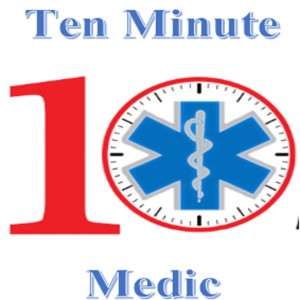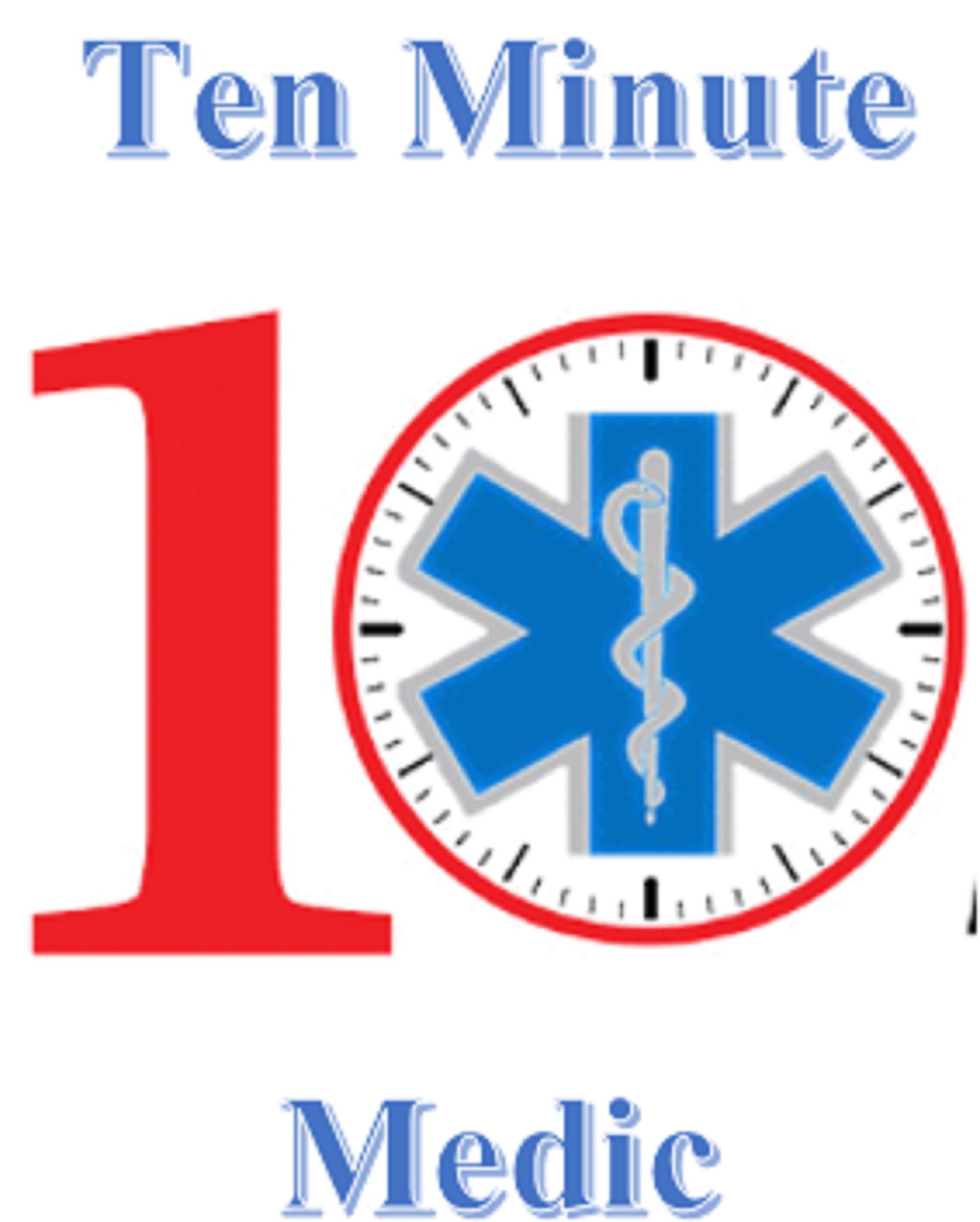Episodes

Sunday Sep 01, 2024
Blood, Sweat, and Fears: Navigating Hemorrhagic Shock
Sunday Sep 01, 2024
Sunday Sep 01, 2024
Today, we're delving into a critical topic that you'll undoubtedly encounter in the field: hemorrhagic shock. By the end of this podcast, you'll have a comprehensive understanding of what hemorrhagic shock is, why it's so dangerous, and why rapid recognition and treatment are crucial. This knowledge will be fundamental to your ability to save lives in emergency situations.

Thursday May 30, 2024
Just A Song Before I Go...
Thursday May 30, 2024
Thursday May 30, 2024
Welcome to "The Ten Minute Medic," your go-to podcast for concise, expert insights into emergency medicine. In our latest episode, we take a look at the critical topic of the pathophysiology of shock.
Join us as we explore how the heart, vasculature, and blood can fail during the shock process, leading to life-threatening consequences. We'll break down the mechanisms behind cardiac output reduction, vascular resistance abnormalities, and blood volume deficits, providing you with a succinct understanding of this complex condition.
Whether you're a seasoned paramedic or just starting out, this episode will equip you with the knowledge to better recognize and manage shock in the field.

Sunday Dec 17, 2023
Sepsis and ETCO2 Monitoring...Not Just For ET Tube Placement Anymore!
Sunday Dec 17, 2023
Sunday Dec 17, 2023
Thanks to Yusuf Ahady for his suggestion on this week's episode. I'll be in touch with Yusuf to get his SWAG package headed his way.
End-tidal CO2 (ETCO2) monitoring, a noninvasive technique measuring the concentration of carbon dioxide in exhaled air, is emerging as a valuable tool in the management of sepsis, a systemic response to infection with potentially life-threatening consequences. In sepsis, the body's response to infection can lead to altered cellular metabolism and changes in respiratory function, both of which can affect CO2 levels. ETCO2 monitoring provides real-time insights into a patient's respiratory status and metabolic activity, which are crucial in sepsis management.
I'd love to hear from you as to the topics that you would like to hear covered. Visit the Ten Minute Medic Facebook page and leave a post on that topic. If it is selected, I'll send you some awesome SWAG!

Monday Dec 04, 2023
Pre-Eclampsia: The Stealth Condition
Monday Dec 04, 2023
Monday Dec 04, 2023
Eclampsia, a life-threatening condition occurring during pregnancy, involves seizures and is preceded by preeclampsia. Understanding eclampsia is crucial for paramedics as it requires immediate medical attention to prevent severe complications for both mother and baby, highlighting the need for prompt recognition and emergency management in pre-hospital settings.
In this episode, we look at the pathophysiology, assessment and treatment of pre eclampsia and eclampsia. In particular a deep dive on the role of magnesium sulfate at the primary prevention and treatment of seizures in this deadly disease.

Sunday Nov 26, 2023
Tiny Bubbles...Reviewing Acute Pulmonary Embolism
Sunday Nov 26, 2023
Sunday Nov 26, 2023
Pulmonary embolism is a condition where one or more blood clots travel from elsewhere in the body, commonly from deep veins in the legs (a condition known as deep vein thrombosis), and lodge in the arteries of the lungs. This blockage can critically reduce blood flow to the lung tissue, causing damage. The lack of perfusion leads to impaired gas exchange as the alveoli are not able to oxygenate the blood effectively. Additionally, the presence of a clot in the pulmonary arteries increases the resistance against which the right ventricle must pump, which can lead to strain and potentially right-sided heart failure, a condition known as acute cor pulmonale.
Make sure to join us for our next episode where we will do a review of pre-eclampsia and eclampsia in the pregnant patient.
Visit our Facebook link. While there, tell us what you would like for us to cover in future Ten Minute Medic episodes. If selected, we'll give you a shout out as well as send you some cool SWAG.

Saturday Nov 18, 2023
Who Is Sgarbossa and Why Is Her Criteria So Important For The AMI Patient
Saturday Nov 18, 2023
Saturday Nov 18, 2023
Understanding Sgarbossa's Criteria is important for paramedic students, similar to knowing that a defibrillator is not just a high-tech paperweight. These criteria are a set of electrocardiographic findings designed to sniff out myocardial infarction (MI) in the presence of a tricky accomplice—left bundle branch block (LBBB) or a paced rhythm.
Understanding this, you can navigate through the confusion of LBBB, where AMIs might be playing an expert game of hide and seek. Applying the criteria allows for the early identification of ST-elevation MI, potentially saving precious heart muscle and, more importantly, the patient’s life—making the difference between a good day and a "why did I get out of bed" day.
In the world of emergency medicine, where 'time is muscle,' knowing Sgarbossa's Criteria ensures that paramedics don't just bring patients to the hospital faster but smarter, with a keener eye for those not-so-obvious cardiac events. This knowledge can turn a paramedic from a simple transporter to a life-saving detective, one ECG at a time.
Don’t forget that we need your help as to what you would like to see in future episodes. Visit the Ten Minute Medic Facebook page and leave your suggestions. If selected, we’ll give you a shout out and send you a small gift as our appreciation.

Sunday Nov 12, 2023
Cardiac Arrest in the Pregnant Patient
Sunday Nov 12, 2023
Sunday Nov 12, 2023
In this episode of the Ten Minute Medic, we delve into the complex pathophysiology of cardiac arrest in pregnant patients, emphasizing why a deep understanding of these unique physiological changes is crucial for effective pre-hospital care and improved maternal and fetal outcomes.
After you have listened, visit the Ten Minute Medic Facebook page and let me know what topic you would like to hear. If your idea is selected, I'll give you a shout out during the podcast.

Wednesday Nov 01, 2023
The Hotel California of Obstructive Respiratory Diseases
Wednesday Nov 01, 2023
Wednesday Nov 01, 2023
In this episode of The Ten Minute Medic, we dive into the essential aspects of asthma for paramedic students. Like the song Hotel California, air checks into the alveoli, but doesn't (tend) to leave without help.
Join us as we explore the pathophysiology behind this common respiratory condition, understanding the inflammation and bronchoconstriction that can lead to life-threatening situations. Learn how to assess a patient experiencing an asthma attack, including key signs and symptoms to watch for. We'll also discuss emergency treatment options, from administering bronchodilators like albuterol to the importance of oxygen therapy.
Whether you're a seasoned paramedic or a newcomer to the field, this episode equips you with the knowledge and skills to manage asthma emergencies effectively in just ten minutes.
After you listen, jump over to The Ten Minute Medic Facebook page at https://www.facebook.com/TenMinuteMedic/. While there leave us a topic or two that you would like to see covered in a future episode. Thanks!

Tuesday Oct 24, 2023
The Great STEMI Imposters
Tuesday Oct 24, 2023
Tuesday Oct 24, 2023
Welcome to our podcast, where we dive into the critical world of cardiology and explore a topic that's of paramount importance for paramedic students. Today, we're shining a spotlight on the often subtle, sometimes deceptive, yet incredibly significant issue of STEMI (ST-segment elevation myocardial infarction) mimics.
These impostors can lead to misdiagnoses and mistreatment, potentially with life-altering consequences. Join the Ten Minute Medic, as we unravel the complexities of recognizing these mimics, understanding their impact, and ultimately, saving lives through informed decisions and early interventions. Discover the key to differentiating fact from fiction in the realm of cardiac emergencies.
Once you have finished listening, head over to our Facebook page @The Ten Minute Medic and let us know what topics you would like to see covered. If selected, we'll give you credit and a shout out on the podcast.

Wednesday Oct 11, 2023
” Greasing the Skids” For Glucose Metabolism
Wednesday Oct 11, 2023
Wednesday Oct 11, 2023
Picture insulin as a key that unlocks the doors of our cells, allowing glucose to enter and power our bodies. When this intricate dance falters, as in diabetes, it can lead to a terrible symphony of health issues. So, think of insulin as the ultimate conductor, directing the harmonious flow of energy that keeps us in tune with life's rhythms.
In this week's episode of the Ten-Minute Medic, we look at how important this hormone is and a little deeper at how it works.
Our next podcast is entitled "The Three Great Imposters"...a look at three common STEMI imposters. Identifying STEMI imposters is like distinguishing a wolf in sheep's clothing in the world of heart emergencies. These cunning look-alikes, such as pericarditis or benign chest pain, mimic the deadly ST-elevation myocardial infarction (STEMI), leading to unnecessary panic and invasive treatments.

